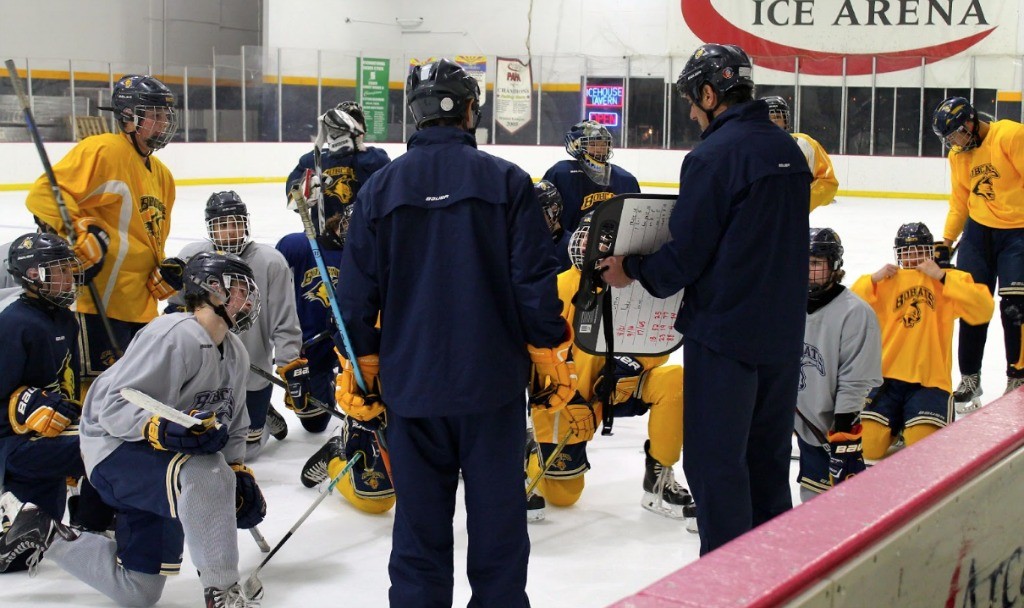Why Coaches Hate Over-Involved Parents
Why Coaches Hate Over-Involved Parents. When did it become okay for Moms and Dads to rant and rave in the stands and feel entitled to text, email and call up their child’s coaches about anything that rubs them wrong?
My husband, Keith Carney, played 17 years in the National Hockey League and then spent three seasons as Player Development Coach of the Chicago Blackhawks before deciding to stay home and coach Bantam hockey in Arizona. I’m surprised that despite his proven success in the game, how often parents (even those who don’t know much about hockey) still question his coaching.
Keith made it to the NHL without his parents ever intervening. Keith’s Dad, Jack, says that he never once questioned a Coach (good or bad) during Keith’s ENTIRE youth hockey career. Jack also coached football himself and said that he used to have to ask kids to track down their parents, if he ever needed them because they were nowhere to be found.
We definitely don’t have that problem anymore. These days too many parents make their presence known, in a negative way. It affects our children’s sports experience and their overall love and passion for the game. Three of my four children play high-level multi-sports, so I get the intensity of it all, but there are certain things I don’t think any parent should ask their kid’s coaches.
If you ask me, I think we should start giving the game back to the kids. Here are six ways parents can let the athlete be the athlete and the Coach be the Coach.
6 Things Parents Should NOT Debate With Their Child’s Coach
- Playing Time: The number one thing parents complain about is their child’s playing time. “Why isn’t my child playing more?” Families put in a lot of time and money and naturally have expectations based on this, but BACK OFF and trust the coach. Any playing time questions should ultimately be an athlete-coach conversation not a parent-coach discussion. If an athlete feels they are being slighted, it’s up to them to talk it over with a Coach. If your child isn’t comfortable doing so, then it must be more important to you than it is to your kid.
- Positioning: Coaches have a method to their madness. They put a lot of thought into their game plans. If they feel they need to switch up player positioning, then they will do it. No Coach needs a parent requesting changes be made to their lineup. Once again, if your athlete feels a change should be made, by all means, they should request a meeting with their Coach.
- Winning: I think a lot of parents forget there’s an important thing called development in youth sports and losses are part of that development. No Coach sets out to purposely lose. They are likely just as competitive as you, if not more. The difference is a good coach understands that sometimes you may have a losing season in spite of gained improvement. It is a huge mistake to only see a winning season as a successful one.
- All-Star teams: Maybe your child will be chosen for the end-of-the-year all-star team or maybe they won’t. Please don’t plead your case to the Coach on why your child is deserving. The decision is not yours to make. And if your athlete isn’t chosen, don’t ask the Coach why not. Use not making that team as a motivating tool for the next season.
- Teammates: Don’t critique your kid’s teammates or question the coach about another’s playing time or overall gameplay. Your focus as a parent should only be on your child and that he is personally developing and enjoying the friends he is making through this sport. If your child is experiencing problems with another in the locker room or on the field, have him talk to the Coach about it.
- Team Strategy: If you don’t really know the ins and outs of the sport, perhaps you should refrain from questioning the Coach about his team strategy. Youth coaches certainly aren’t raking in the dough, so they aren’t coaching your kid for the money. Coaches are passionate about their sport and want to teach this next generation to play a game that they love.
More great articles we think you’ll like from Ilovetowatchyouplay.com;
A Secret Trick To Keeping Your Sanity At Your Kid’s Game
9 Things Good Sports Parents Do Not Do
Does Your Child Have The Mindset Of An NFL Star?
15 Signs Your Child Plays On An Elite Team
